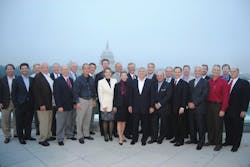NAMA Returns From 2012 Public Policy Conference With Better Relationships Ensuring Vending's Significant Issues Will Be Heard By Lawmakers
The National Automatic Merchandising Association's board of directors returned this week from the inaugural NAMA public policy conference in Washington, D.C. The conference, taking place over a two-day period, included wide-ranging meetings with representatives from congressional, executive branch and federal agency offices including the White House office of business liaison, the federal reserve, and the office of the speaker of the house. Discussions focused on issues critical to the industry, including taxes, industry, including taxes, nutrition and calorie disclosure, healthcare reform, interchange fees and Americans with Disabilities Act (ADA) compliance.
“This was an important step in furthering the industry’s presence in Washington, DC. Overall, the outcome for vending and refreshment services cannot be overstated. We are building the right relationships that will enhance our ability long-term to ensure our industry’s voice is heard. We will continue to weigh in strongly on issues that have measurable impact on our members, both now and in the future,” said Carla Balakgie, president and CEO of NAMA, in a prepared statement.
“The bottom line is that we consider advocacy ‘job no.1’ and the discussions our board of directors conducted signal a significant move forward as we continue to work on these issues, day-in and day-out.”
The meetings were designed to provide a forum for discussion and exploration on the breadth and scope of industry issues, with the intent to deliver actionable results moving forward. For example, during the meeting with representatives from the White House office of business liaison (WHOB), NAMA showcased its Balance for Life/Fit Pick initiatives as a form of industry self-regulation and long-standing commitment to enabling informed and nutritious consumer choice in vending and refreshment services. This resulted in agreement by the WHOB to consider future collaborative efforts that build on this program’s strong foundation.
Additionally, NAMA participated in strategic discussions on the topic of interchange fees.
“Raising awareness among congressional and regulatory officials with the requisite jurisdictional oversight regarding the short and long term impacts of debit card interchange fees on micro-transaction sales helped to create an environment to affect future change,” according to Balakgie.
NAMA members, furthermore, shared their concerns regarding the potential impact of regressive and punitive taxes on vending and refreshment services, such as those on sugar-sweetened beverages during a meeting with staffers from the house committee on ways and means.
“Our leadership and board of directors met with a powerful cross-section of government officials and staffers. From an association and industry viewpoint, this conference exceeded our expectations,” said Balakgie. “It’s important to recognize that this is a meaningful development in an ongoing, long-term process. The need for industry efforts like this will never abate.”
